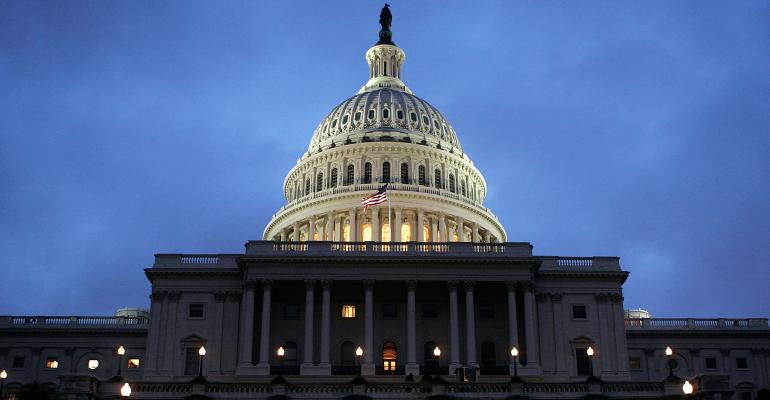Tax policy experts are in vogue. A Republican sweep in the elections gave a great boost to the scope of tax reform legislation and its immediacy. Republicans lawmakers are all-in for a comprehensive tax bill that lowers tax rates and spurs economic growth, but how soon are we going to get it? How much lead time do you have to prepare your clients?
An August White House Rose Garden signing ceremony is perhaps wishful thinking. From where I sit, it looks more like it will be an indoor affair near the White House Christmas tree.
Why, if the House of Representatives is readying a tax reform bill and can fast-track it using “reconciliation,” will it take so long to become law? The short answer is the Senate.
The House
The House has their ducks in a row. They have a comprehensive outline of a bill that the House tax-writing committee, the Ways and Means Committee, is drafting legislative language around to bring that outline to life. After that the Committee will refine the bill, based on input from its members, and then pass it with probably all Republican committee members voting for it and probably no Democrats. The bill would then be passed, with minor adjustments, by the full House with at least 218 votes with, again, mostly all Republicans and virtually no Democrats. That’s the way of the House. Majority party rules.
The Senate
As for the Senate, they’re in a different place with thornier rules and procedures than the House, which is why we won’t see quick action on tax reform.
Until very recently, Chairman Orrin Hatch (R-UT) of the Senate’s tax-writing committee was devoting his time to working on a narrower, business-only tax reform bill. So the Senate’s tax-writing committee is way behind thinking through a comprehensive tax reform bill. Add to that the dozens of nominations the Senate has to process for the incoming administration, and the distance only furthers.
Furthermore, the Senate is a different creature from the House — set up that way by our founding fathers. The Senate Democrats have tremendous power to slow down and stop legislation with the filibuster. So, once Senate Republicans get together on a tax bill they want to pass, they need 60 votes to avoid a filibuster by the Democrats. Because Republicans only have 52 votes, they need to persuade eight of their colleagues on the other side to join them.
So Eight is Enough (cue the ‘70s sitcom music).
Eight is also a lot. Which presupposes that all the Republicans, even the squishy ones, will fall into line, which isn’t what Senators are known for. Negotiation, compromise and cajoling take time, which is why there’s no speedy path to tax reform in the Senate.
Reconciliation
Is there a speedier path? You’ve probably been reading about a way to fast-track tax reform called “reconciliation” and you’ve probably been throwing that term around at cocktail parties hoping no one asks for details.
So, what’s reconciliation? Among other bells and whistles, it’s a way to more easily and quickly pass tax and spending legislation, and in the Senate, that can be done with only 51 votes. If Republicans can corral their own, they can pass a bill without a single Democrat. However, because it essentially revokes the power of the minority, it isn’t used very often for sweeping legislation.
The last time it was successfully used by the House and Senate for a major piece of legislation was in 2010 to pass parts of the Affordable Care Act (ACA). Democrats held both houses of Congress and the White House. The bill passed the Senate with 56 Democrats supporting and no Republicans, and President Obama signed it. Since then, it’s been attacked every day of every month. Fastforward seven years to this month, and a Republican-controlled Congress is about to repeal a majority of the ACA.
That should tell you something. Turnabouts generally don’t happen with bills that are passed with both Democratic and Republican support.
Another thorn related to reconciliation is that the tax provisions in those bills are generally designed to sunset after 10 years, to ensure the deficit doesn’t increase. That’s right, even if Democrats didn’t try to undo it along the way, the tax provisions would have to be taken up again in 10 years or they would expire. Now for some of you that’s probably the best news you’ve heard, but that’s not practical at all.
For a lot of reasons, Senate Republican leaders, including Chairman Hatch, are adamant that the Senate makes every effort to attract Senate Democrats to join them in passing a comprehensive tax reform bill before moving to the fast-tracked reconciliation process.
Is a bipartisan bill a pipedream? Maybe not. There are 10 Democratic Senators that will face their voters in 2018 in states that Trump won—Wisconsin, Ohio, Pennsylvania, Florida, Michigan, Indiana, North Dakota, West Virginia, Missouri and Montana. So that’s where you start. Those 10 Democratic Senators have an incentive to show their voters they’re working with Trump and the Republicans, and it’s those Senators that Hatch and others will heavily lean on to cobble together a bipartisan bill.
So let’s sum it up. The House will pass a partisan tax reform bill quickly—maybe by late spring or early summer. The Senate will try to pass a bipartisan tax reform bill but may ultimately fail and have to pass a partisan tax reform bill using reconciliation. Either event probably won't happen until late fall. Just in time for an indoor signing ceremony next to the White House Christmas tree.





